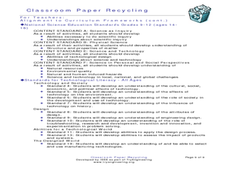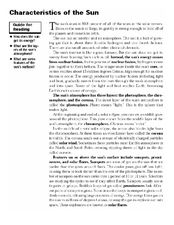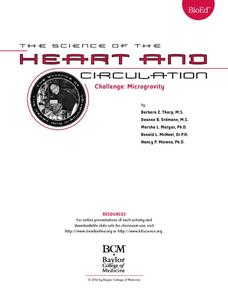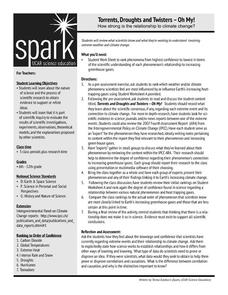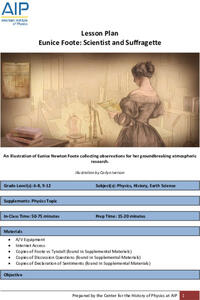Institute of Electrical and Electronics Engineers
Sugar Crystal Challenge
Blow your learners' minds with a sweet lesson on nanotechnology that uses sugar to demonstrate the difference nanoscale surface area makes in dissolving and crystal formation. Plenty of supportive background information is read to...
Institute of Electrical and Electronics Engineers
Tinkering with Tops
Get kids' heads spinning by challenging them to design a top that will rotate for a minimum of 10 seconds without leaving a 30-cm circle. Groups of learners collaborate through a planning stage, testing stage, and evaluation stage. Some...
Institute of Electrical and Electronics Engineers
Classroom Paper Recycling
After reading about the history and recycling of paper, creative crafters collaborate to think of a new process for making recycled paper. A complete teacher's guide and student worksheets are included. There is no written procedure for...
Institute of Electrical and Electronics Engineers
Nano Waterproofing
This lesson plan will make an impact, especially on scientist-athletes who may have an interest in waterproof clothing! Acting as materials engineers, they work collaboratively on waterproofing pieces of cotton fabric. This challenge is...
Institute of Electrical and Electronics Engineers
Telescoping Periscope
Ahoy, matey! Here is an engineering expedition that mini mariners are sure to be swept away by! After reading a brief description and history of periscopes, they work in crews to construct one. Use this activity to enhance a...
Institute of Electrical and Electronics Engineers
Filtration Investigation
Scholars build a simple filtration system to remove impurities from muddy water and rate the filtered water to a grade of clarity scale. The focus is on teamwork and problem solving. This instructional activity would be effective in your...
Institute of Electrical and Electronics Engineers
Exploring at the Nanoscale
Nano-nano! Nanotechnology can seem like it's from another planet! After learning about this tiny technology, collaborative groups experiment with how smaller particles affect chemical reactions. They do this by immersing a whole and a...
Institute of Electrical and Electronics Engineers
Working with Watermills
In collaborative groups, emerging engineers or environmental scientists plan and construct a water wheel or watermill that rotates for a total of three minutes. Everything you need to carry out this lesson is included: objectives,...
Rice University
Characteristics of Inner Planets
Aspiring astronomers assess the inner planets using this handout. They read about the characteristics of each, noting that all four of them have rocky surfaces. Rotation and revolution are introduced, including Venus' retrograde...
Rice University
Characteristics of the Sun
After reading about how the sun gets its energy, and about the layers and features of the sun's atmosphere, heliologists complete a comprehension worksheet. On it, they label features on a diagram of the sun and match terms from the...
Baylor College
Challenge: Microgravity
What a festive way to examine what happens to the heart in different gravitational situations! Small groups place a water-filled balloon in different locations (on a table top, in a tub of water, and held in a vertical position), drawing...
Baylor College
Neural Network Signals
Using a simple circuit with the battery representing the brain, future physiologists test to see which solutions conduct electrical "nerve impulses." Enlighten learners with plentiful information on electric signals in the nervous system...
Baylor College
Pre-Assessment: The Brain
Break your class in to the general structure and function of the brain. Brainiacs discuss what they know about it and create personalized brain development timelines. They also take a true-false, pre-assessment quiz to get them thinking...
Baylor College
What Is a Neuron?
Your class won't get on your nerves while doing this modeling activity! After teaching the structure and function of a neuron using the included diagrams, give individuals some clay and chenille stems so that they can make their own...
Baylor College
Neurotransmitters Contain Chemicals
Human body systems students play a card game, "Locks & Keys" in order to learn that neurotransmitters carry a message from one neuron to another by fitting into a receptor site on the receiving nerve cell. While this activity can...
Baylor College
Crossing the Synaptic Gap
As part of a unit on the chemistry of the brain, thinkers learn how chemicals work to transmit messages between individual neurons and how controlled substances impact the synaptic cleft. They do so by playing a dice-and-card game in...
Scholastic
Study Jams! Photosynthesis
One friend explains to another that plants combine water and carbon dioxide with the energy of the sun to produce sugar and oxygen. She mentions the roles of the roots, chloroplasts, and stomata in an engaging video that reviews how...
Center Science Education
Tracking Hurricane News
Here is a unique twist for your lesson on hurricanes. After examining extreme weather news headlines, your storm chasers view a PowerPoint about hurricanes and then zoom in on Hurricane Irene. They map a timeline of her trek up the East...
Center Science Education
Weather in the News
Tornadoes, blizzards, and hurricanes, oh my! In this lesson, meteorology majors compare stories of historical storms written by two or more different sources. As a result, they understand how the media portrays such catastrophes and...
Center Science Education
Torrents, Droughts, and Twisters - Oh My!
What is causing the extreme weather happening around the planet? Middle and high schoolers read about climate change as a possible link to such phenomena. Then they form groups to discuss and research one of the types of weather events....
Berkeley Engineering and Mentors
Egg Drop
How do different shapes affect the outcome associated with hard impact? All you need is an egg and some recycled materials to find out. Kids experiment to understand how airbags work to lessen the impact of two different types of...
Curated OER
Youth Obesity: Schools Fight Back
Explore nutrition and healthy eating habits with a study on youth obesity. Learners watch a PBS documentary on the obesity epidemic which discusses government programs aimed at healthier choices, as well as more localized efforts. Kids...
Scholastic
Stressed Out?
Provide tweens and teens with information they need to know about stress with an article that details how stress affects various organs in the body. The article also offers tips for healthy ways to cope with stress.
American Institute of Physics
Eunice Foote: Scientist and Suffragette
The greenhouse effect and climate change are hot topics in today's news. Young scientists may be surprised to learn that the concept is not a new one. In fact, Eunice Newton Foote, scientist, inventor, and suffragette, discovered the...



